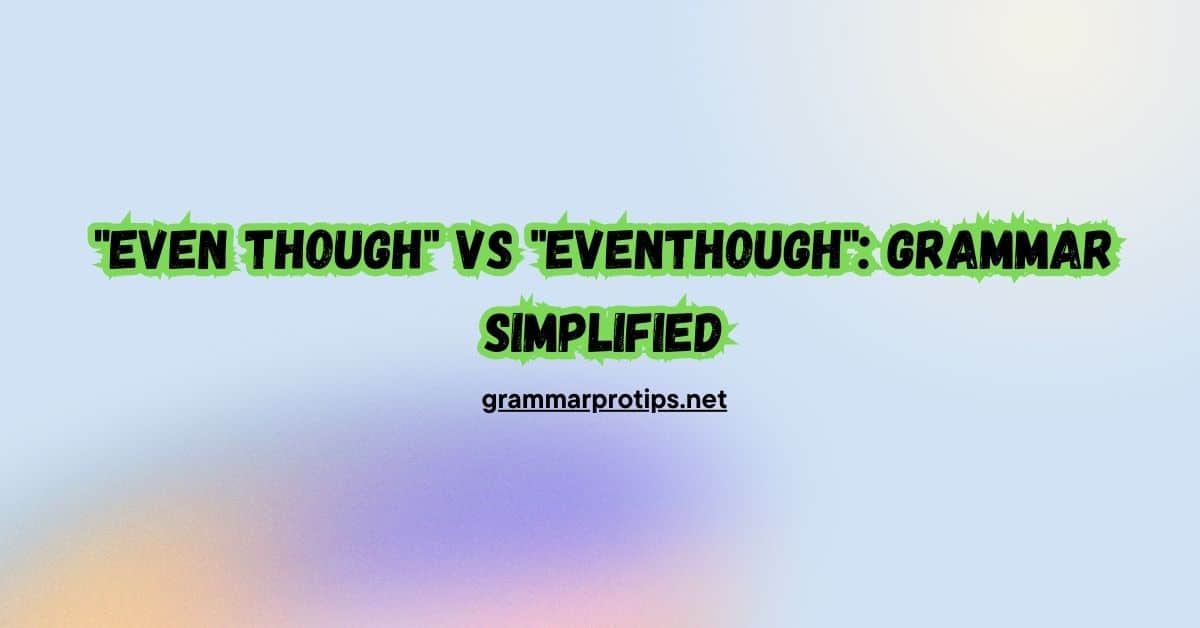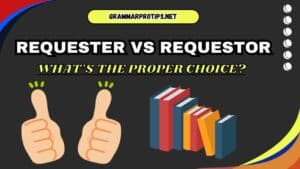Understanding the difference between “even though” and “eventhough” might seem a little tricky at first, but don’t worry I’m here to break it down in a way that’s easy to grasp! In this article, we’ll go through the grammar rules, clarify the meaning of both terms, and provide real-life examples in different contexts.
By the end, you’ll know exactly when to use “even though” or “eventhough” in your writing and speech.
The Basics: What’s the Difference?
At its core, “even though” is the correct form, while “eventhough” is a common misspelling. It’s a small difference, but it can trip up even native speakers sometimes. So, let’s dig into it and get things straight.
“Even Though”
“Even though” is a conjunction used to introduce a contrast. It connects two clauses, where the second one contrasts or provides an exception to the first. It’s like saying, “despite the fact that” or “although.” Here’s an easy way to remember it: “even though” is always written as two words.
“Eventhough”
On the other hand, “eventhough” is incorrect. It’s a common typo or misspelling of “even though.” English is full of tricky spelling patterns, but “eventhough” isn’t part of them. If you want to keep your writing polished and grammatically correct, stick to “even though.”
Meaning of “Even Though”
Before diving deeper into examples, let’s make sure we understand the meaning of “even though.”
“Even though” is used to introduce something that is surprising or unexpected, given the circumstances. It often introduces a situation or action that seems to go against the main idea. For instance, when you say:
- “Even though it was raining, I went for a walk.”
It shows that the rain (the unexpected situation) didn’t stop you from going for a walk.
Even Though vs Eventhough: Which One to Choose?
If you’re ever stuck between “eventhough vs even though,” here’s a quick tip: choose “even though” every time. There’s no exception to this rule—“eventhough” doesn’t exist in standard English grammar.
Even Though Example in Context:
Let’s look at a few examples in real-life scenarios to better understand how “even though” works in sentences. We’ll start with an email example to show how it can be applied in everyday communication.
Email Example:
Subject: Delay in Project Deadline
Dear Michael,
I wanted to update you on the progress of the current project. Even though we encountered a few unexpected hurdles, we’re on track to meet the final deadline. The team has worked hard to overcome these challenges, and we’re confident that the remaining tasks will be completed promptly.
I’ll keep you posted if anything else comes up, but at the moment, everything is moving along smoothly. Please feel free to reach out if you have any questions.
Best regards,
Sarah
In this email, “even though” introduces the unexpected difficulty (the hurdles) that didn’t stop Sarah from reassuring Michael that the deadline would still be met.
Even Though Pronunciation
When saying “even though,” the pronunciation is fairly straightforward. You’ll pronounce it just as it’s written:
“ee-vuhn” (even) + “th-oh” (though). It’s pretty simple and doesn’t require any special emphasis, but keep in mind that the “th” in “though” is soft, like in words such as “think” or “this.”
When to Use “Even Though”
To make things easier, let’s look at situations where you should use “even though” in your writing and speech. It’s often used in:
- Contrasting statements
When you want to show that something unexpected happened, despite a particular condition or fact.
Example: “Even though the movie was long, I still enjoyed it.” - Expressing surprise or contradiction
When something goes against expectations.
Example: “Even though he studied hard, he didn’t pass the exam.”
Eventhough or Although?
You might also wonder, “Is “eventhough or although” the better option in certain cases? In short, “although” is another correct way to express a contrast, but it’s used a bit differently than “even though.”
While “even though” tends to add more emphasis on the contrast, “although” is a bit more neutral. Both can be used interchangeably, but “even though” often carries a slightly stronger sense of surprise.
Example Comparison:
- Even though he was tired, he finished the race.
- Although he was tired, he finished the race.
Both sentences make the same point, but “even though” feels a bit more emphatic.
Spell Even Though Correctly
Sometimes people spell “even though” incorrectly as “eventhough” out of habit or typing quickly. To avoid this mistake, remember: there are two words in “even though”—never one. When you catch yourself trying to write it as one word, slow down and correct it.
Fun Fact:
In some cases, “even though” can be used at the beginning of a sentence for emphasis. Here’s how you can structure it:
“Even though” she was feeling ill, Maria still showed up to the party.
Quick Table for Reference:
Here’s a simple table to summarize the differences between “even though” and the incorrect form “eventhough”:
| Correct Form | Incorrect Form | Usage Example |
|---|---|---|
| Even though | Eventhough | “Even though it was cold, we went outside.” |
| Even though | Eventhough | “Even though she was busy, she helped me.” |
| Even though | Eventhough | “Even though they argued, they remained friends.” |
As the table shows, “even though” is always the right choice!
Even Though: A Key Takeaway
To wrap things up, here are the key takeaways from this article:
- “Even though” is a conjunction used to show contrast, meaning “despite the fact that.”
- “Eventhough” is not a valid form of this expression. Always use “even though.”
- “Even though” can be used in various contexts, like emails, conversations, and more.
- Be mindful of pronunciation: “even though” is pronounced as “ee-vuhn th-oh.”
- “Although” is a good alternative, but it’s slightly less emphatic than “even though.”
Now that we’ve gone over the rules and usage, it’s time for you to put this knowledge into practice. Make sure to use “even though” correctly in your writing and speech, and you’ll sound much more polished.

Sienna Mauldon is a passionate writer and grammar expert. On her blog, she shares easy-to-follow guides to help readers master grammar rules and improve their writing. With a love for language and teaching, Sienna makes grammar simple and fun for everyone, from beginners to experienced writers.








